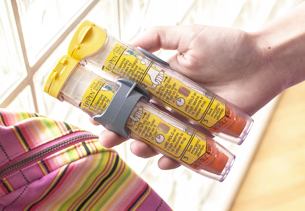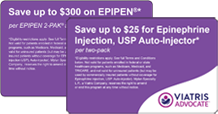INDICATIONS (the following information applies to both EPIPEN and its Authorized Generic)
EPIPEN® and EPIPEN JR® Auto-Injectors are used to treat life-threatening, allergic emergencies in people
who are at risk for or have a history of serious allergic emergencies. EPIPEN and EPIPEN JR are for
immediate administration by you or your caregiver. They do not take the place of emergency medical
care. You should get emergency help right away after using your EPIPEN of EPIPEN JR.
IMPORTANT SAFETY INFORMATION (the following information applies to both EPIPEN and its Authorized Generic)
EPIPEN® (epinephrine injection, USP) 0.3 mg and EPIPEN JR® (epinephrine injection, USP) 0.15 mg Auto-Injectors are used to treat allergic emergencies (anaphylaxis). Anaphylaxis can be life threatening and
happen within minutes. If untreated, anaphylaxis can cause death. This allergic emergency can be
caused by stinging and biting insects, allergy injections, foods, medicines, exercise, or unknown causes.
Always carry 2 EPIPEN or 2 EPIPEN JR Auto-Injectors with you because sometimes a single dose of
epinephrine may not be enough to treat a serious allergic reaction before seeking medical care.
When you have an allergic emergency (anaphylaxis), use EPIPEN or EPIPEN JR auto-injectors right
away. Get emergency medical help right away even if you have used the EPIPEN or EPIPEN JR auto-injector.
You can use a second EPIPEN or EPIPEN JR auto-injector if symptoms continue or if the first
auto-injector is activated. If you need more than 2 doses for an allergic emergency, they must be given
by a healthcare provider.
Before you use EPIPEN or EPIPEN JR auto-injectors, tell your healthcare provider about all your
medical conditions if you have heart problems with high blood pressure, diabetes, thyroid problems,
asthma, a history of depression, Parkinson’s disease, are pregnant or plan to become pregnant, are
breastfeeding or plan to breastfeed.
Tell your healthcare provider about all the medicines you take, including prescription and over-the-counter
medicines, vitamins and herbal supplements. Tell your healthcare provider about all of your
known allergies. If you have certain medical conditions, or take certain medicines, your condition may
get worse, or you may have longer lasting side effects when you use your EPIPEN or EPIPEN JR auto-injector.
Especially tell your healthcare provider if you take certain asthma medicines. EPIPEN and EPIPEN JR
and other medicines may affect the way other medicines work. Other medicines my affect how EPIPEN
and EPIPEN JR auto-injector works.
EPIPEN or EPIPEN JR auto-injector should be injected into the middle of your outer thigh (upper leg),
through clothing if necessary. Do not inject into your veins, buttocks, fingers, toes, hands or feet. It is
very important that you hold the EPIPEN or EPIPEN JR auto-injector down firmly on the middle of the
outer thigh (upper leg) for at least 3 full seconds. If you do not hold it in place long enough, the
EPIPEN or EPIPEN JR auto-injector might not have time to deliver the correct dose of medicine. If you
accidentally inject EPIPEN or EPIPEN JR auto-injectors into any place other than the middle of your outer
thigh, go to the nearest emergency room right away. If you inject a young child, hold their leg firmly in
place before and during the 3 second injection to prevent injuries.
Rarely, patients who have used EPIPEN or EPIPEN JR auto-injectors may get infections at the injection
site within a few days. Some of these infections can be serious. Call your healthcare professional right
away if you have any of the following at an injection site: redness that does not go away, swelling,
tenderness, or the area feels warm to the touch.
Common side effects include fast, irregular or “pounding” heartbeat, sweating, nausea or vomiting,
breathing problems, paleness, dizziness, weakness, shakiness, headache, feelings of over excitement,
nervousness or anxiety. These side effects may go away with rest. Tell your healthcare professional if
you have any side effect that bothers you or that does not go away.
Call your doctor for medical advice about side effects. You may report side effects to FDA at 1-800-FDA-
1088.
Please see the full Prescribing Information and Patient Information for EPIPEN.
Please see the full Prescribing Information and Patient Information for the Authorized Generic for EPIPEN.
For additional information please contact us at 800-796-9526.
You are encouraged to report negative side effects of prescription drugs to the FDA. Visit www.fda.gov/medwatch or call 1-800-FDA-1088.

EPI-2018-0364
EPIPEN®, EPIPEN JR®, EPIPEN 2-PAK®, EPIPEN JR 2-PAK®, EPIPEN4SCHOOLS®, NEVER-SEE-NEEDLE®, LIFE HAPPENS. Be Prepared®, the EPIPEN / EPIPEN JR Logo and the Mylan Logo are registered trademarks of Mylan Inc., a Viatris Company. VIATRIS and the Viatris Logo are trademarks of Mylan Inc., a Viatris Company. All other trademarks and service marks are the property of their respective owners. This website is intended for residents of the United States who will have their prescription filled at a pharmacy in the United States.
© 2023 Viatris Inc. All Rights Reserved. EPI-2021-0130 V4






